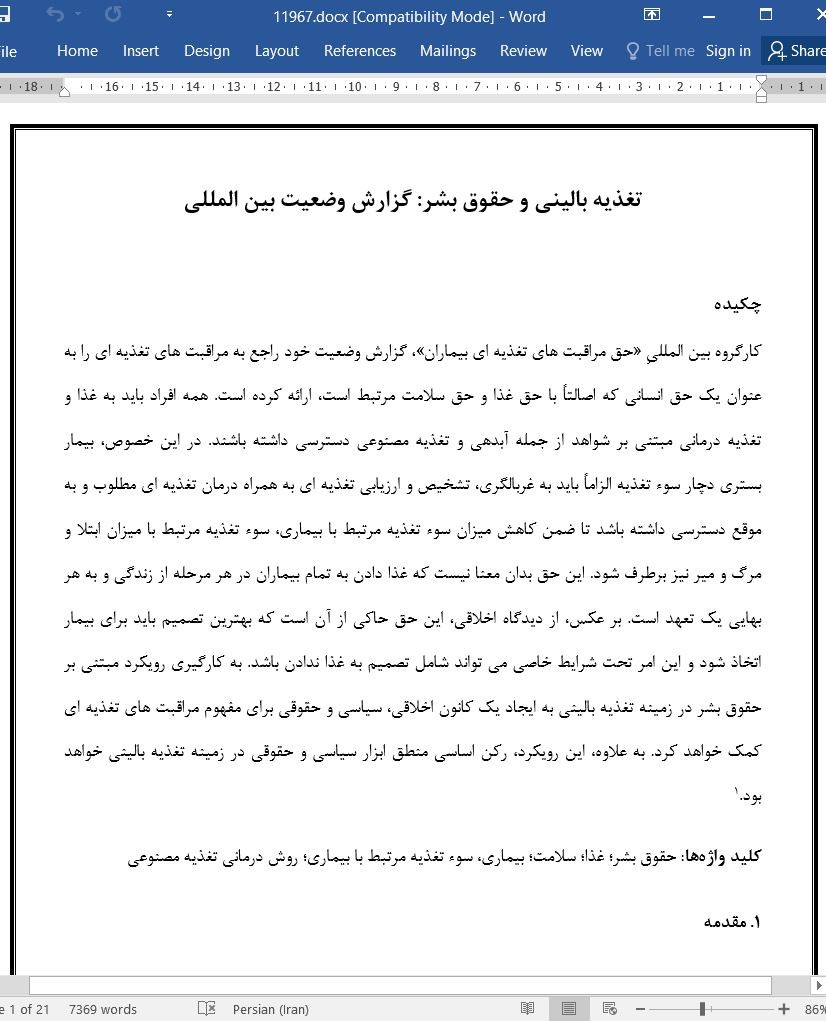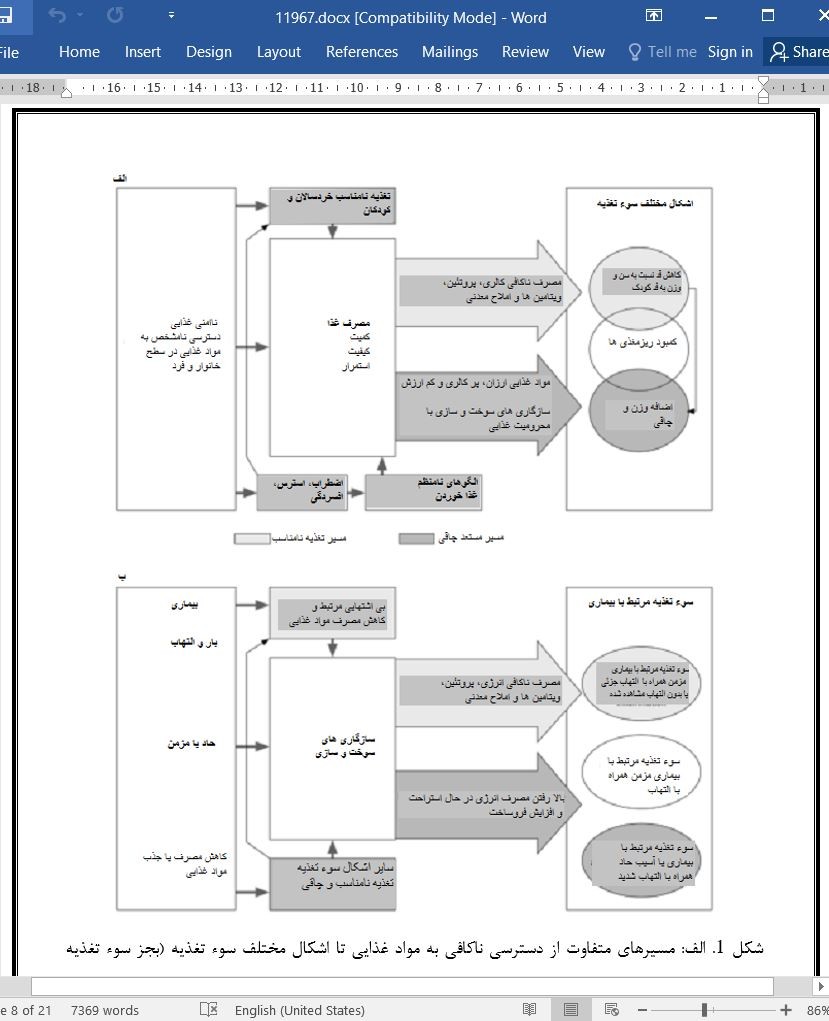
تغذیه بالینی و حقوق بشر: گزارش وضعیت بین المللی
چکیده
کارگروه بین المللیِ «حق مراقبت های تغذیه ای بیماران»، گزارش وضعیت خود راجع به مراقبت های تغذیه ای را به عنوان یک حق انسانی که اصالتاً با حق غذا و حق سلامت مرتبط است، ارائه کرده است. همه افراد باید به غذا و تغذیه درمانی مبتنی بر شواهد از جمله آبدهی و تغذیه مصنوعی دسترسی داشته باشند. در این خصوص، بیمار بستری دچار سوء تغذیه الزاماً باید به غربالگری، تشخیص و ارزیابی تغذیه ای به همراه درمان تغذیه ای مطلوب و به موقع دسترسی داشته باشد تا ضمن کاهش میزان سوء تغذیه مرتبط با بیماری، سوء تغذیه مرتبط با میزان ابتلا و مرگ و میر نیز برطرف شود. این حق بدان معنا نیست که غذا دادن به تمام بیماران در هر مرحله از زندگی و به هر بهایی یک تعهد است. بر عکس، از دیدگاه اخلاقی، این حق حاکی از آن است که بهترین تصمیم باید برای بیمار اتخاذ شود و این امر تحت شرایط خاصی می تواند شامل تصمیم به غذا ندادن باشد. به کارگیری رویکرد مبتنی بر حقوق بشر در زمینه تغذیه بالینی به ایجاد یک کانون اخلاقی، سیاسی و حقوقی برای مفهوم مراقبت های تغذیه ای کمک خواهد کرد. به علاوه، این رویکرد، رکن اساسی منطق ابزار سیاسی و حقوقی در زمینه تغذیه بالینی خواهد بود.
۱. مقدمه
سوء تغذیه (به عبارتی، نبود تغذیه مناسب، ناکافی بودن ویتامین ها یا املاح معدنی، اضافه وزن و چاقی) یکی از عوامل اصلی بار بیماری است و بر همین اساس، ارائه مراقبت های تغذیه ای مطلوب قطعاً راهبرد موثری جهت کاهش بار جهانی آن خواهد بود [2، 1]. این وضعیت در کودکان به مراتب حادتر است که دلیلش تنها بی توجهی به سوء تغذیه که متخصصان حوزه سلامت را بابت تهدید واقعی برای کودک پاسخگو می کند، نیست بلکه فرد بزرگسالی است که وی در آینده به آن تبدیل خواهد شد. در زنان باردار و کودکان، سوء تغذیه یکی از عوامل تعیین کننده موثر برای سلامت در دوران بزرگسالی است. این همان مفهوم «منشا اولیه بزرگسال» یا «منشأهای رشد سلامت و بیماری» (DOHaD) و یا «برنامه نویسی جنینی/برنامه نویسی رشدی» است. در این وضعیت ها، سوء تغذیه، اثرات طولانی مدت همراه با اثرات بالقوه بر سلامت نسل های آینده دارد [4، 3]. تاثیر مثبت مراقبت های تغذیه ای با ظرفیت آن جهت تاثیرگذاری بر عواقب بیماری به ویژه جمعیت آسیب پذیر دچار سوء تغذیه مرتبط است [8-5]. در واقع، مراقبت های تغذیه ای به کاهش میزان ابتلا به بیماری، مرگ و میر، طول مدت اقامت در بیمارستان و نیز کاهش تعداد بستری های مجدد کمک می کند. بنابراین، این مراقبت ها مقرون به صرفه تلقی شده و می تواند بر پایداری مالی سیستم های خدمات درمانی تاثیر بگذارد [13-9].
Summary
The International Working Group for Patients' Right to Nutritional Care presents its position paper regarding nutritional care as a human right intrinsically linked to the right to food and the right to health. All people should have access to food and evidence-based medical nutrition therapy including artificial nutrition and hydration. In this regard, the hospitalized malnourished ill should mandatorily have access to screening, diagnosis, nutritional assessment, with optimal and timely nutritional therapy in order to overcome malnutrition associated morbidity and mortality, while reducing the rates of disease-related malnutrition. This right does not imply there is an obligation to feed all patients at any stage of life and at any cost. On the contrary, this right implies, from an ethical point of view, that the best decision for the patient must be taken and this may include, under certain circumstances, the decision not to feed. Application of the human rights-based approach to the field of clinical nutrition will contribute to the construction of a moral, political and legal focus to the concept of nutritional care. Moreover, it will be the cornerstone to the rationale of political and legal instruments in the field of clinical nutrition.
1. Introduction
Malnutrition (i.e. undernutrition, inadequate vitamins or minerals, overweight and obesity) is a major contributor to disease burden and thus, the delivery of optimal nutritional care should be an effective strategy to reduce its global burden [1,2]. The situation is even more acute in children, not only because neglecting malnutrition makes health professionals accountable for an actual threat to the child, but also for the future adult she/he will become. In childbearing women and children, malnutrition is a strong determinant of health in adulthood. This is the concept of the “early origin of adult” or “developmental origins of health and disease” (DOHaD) or “fetal programming/developmental programming”. In these situations, malnutrition has long lasting effects with potential impacts on the health of future generations [3,4]. The positive impact of nutritional care is related to its capacity to influence disease outcomes, particularly the vulnerable malnourished population [5e8]. Indeed, nutritional care contributes to reduced morbidity, mortality, length of hospital stay as well as fewer readmissions. Therefore, it is considered cost effective, and may influence the financial sustainability of health care systems [9e13].
چکیده
1. مقدمه
2. . رویکرد مبتنی بر حقوق بشر
3. سلامت و حقوق بشر
4. مراقبت های تغذیه ای به عنوان یک حق انسانی
4.1 پیدایش حق مراقبت های تغذیه ای
4.2 حق غذا در حوزه بالینی
4.3 تعریف مراقبت های تغذیه ای به عنوان یک حق اساسی
4.4 حق سلامت و مراقبت های تغذیه ای
5. رویکرد اخلاقی
5.1 تدوین یک رویکرد مبتنی بر حقوق بشر در حوزه تغذیه بالینی: دیدگاه های مربوط به تغذیه بالینی
6. نتیجه گیری
مراجع
Summary
Abbreviations
1. Introduction
2. The human rights-based approach
3. Health and human rights
4. Nutritional care as a human right
4.1. The emergence of the right to nutritional care
4.2. The right to food in the clinical context
4.3. The definition of nutrition care as a fundamental right
4.4. The right to health and nutritional care
5. The ethical approach
5.1. Developing a human rights-based approach to clinical nutrition: perspectives for clinical nutrition
6. Conclusion
Authorship statement
Conflicts of interest
Acknowledgements
References
Hide outline
- اصل مقاله انگلیسی با فرمت ورد (word) با قابلیت ویرایش
- ترجمه فارسی مقاله با فرمت ورد (word) با قابلیت ویرایش، بدون آرم سایت ای ترجمه
- ترجمه فارسی مقاله با فرمت pdf، بدون آرم سایت ای ترجمه



